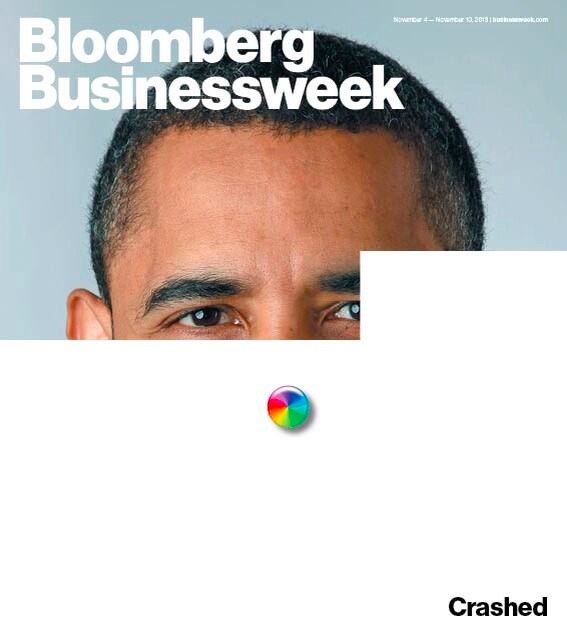Apple's increasing visibility on the PC desktop, and in national politics and global culture, has resulted in the Mac's multicolored "beach ball" wait cursor becoming more recognizable to a general audience than the icons used by Windows.

ObamaS X
The latest cover by Businessweek for its November 3 edition metaphorically portrays U.S. President Obama as "crashed," and in need of a reboot, depicting him as a partially loaded image with the wait beach ball cursor from OS X.
Notably, the national news magazine didn't use either the historical hourglass icon from Windows xp and earlier versions, nor the animated blue circle Microsoft began using with Windows Vista. An entire generation might not recognize the meaning of either one.
Despite maintaining a greater overall share of the PC installed base, Windows doesn't have the same cachet as Apple's Macs, which are now used so broadly that the coy image Businessweek used didn't need to provide further context in order to explain the joke.
ObamaPhone
The political commentary is also interesting in that President Obama himself associated the launch problems related to his efforts to reform U.S. health insurance with the launch of new Apple's iOS 7.
"Consider that just a couple of weeks ago, Apple rolled out a new mobile operating system, and within days, they found a glitch, so they fixed it," the president said.
"I don't remember anybody suggesting Apple should stop selling iPhones or iPads or threatening to shut down the company if they didn't," Obama continued. "That's not how we do things in America. We don't actively root for failure."
President iPad
Apple's increasingly dominant position in technology globally was already well founded in 2009 when Obama was elected, based on years of success with iPod, the blockbuster launch of iPhone and the increasing presence of OS X.
However, during his presidency Apple has turned from a success story to an unstoppable force, with both a global presence and a distinctly American identity that has gained tremendous popularity throughout the federal government, the armed forces and in regular use by the president himself.
Jobs presented Obama with a pre-release iPad 2, and the president praised Jobs as an example of the 'American Dream,' stating, "something that's always been the greatest strength of America is a thriving, booming middle class, where everybody has got a shot at the American dream. And that should be our goal. That should be what we're focused on: how are we creating opportunity for everybody? So that we celebrate wealth. We celebrate somebody like a Steve Jobs, who has created two or three different revolutionary products. We expect that person to be rich, and that's a good thing. We want that incentive. That's part of the free market."
Conversely, Apple's growing stature has enabled it to initiate significant new investment in the U.S. economy, with billions of dollars worth of retail expansion and infrastructure spending, including massive new green iCloud data centers throughout the country, as well as the production of the high-tech new Mac Pro, the reestablishment of modern manufacturing that Apple first attempted in the 80s, followed by Steve Jobs' efforts to build American NeXT hardware in 1990.
Obama touted Apple's Mac Pro efforts in his State of the Union address in February, stating "Caterpillar is bringing jobs back from Japan. Ford is bringing jobs back from Mexico. And this year, Apple will start making Macs in America again." Obama also invited Apple's chief executive Tim Cook to the event.
Forget success, let's actively root for failure
Fueled by the popularity of its high quality products leading satisfaction rankings, Apple continues to rake in majority of the global PC and mobile industries' profits despite its competitors' dumping their own offerings on the market in vast volumes at or near their production cost. That includes Samsung, which shipped more than three times as many phones as Apple in the last quarter, but earned far less from all of those sales.
Much like Obama's own news nemesis, Strategy Analytics has defined itself as a font of metrics trying to propagate the idea that Apple's iPhone, iPad and other products competing against Samsung are failing in terms of global market share, a meme broadly reported by tech journalists without criticism.
The tech media doesn't question why Apple is making more money than the rest of the phone industry combined, or, conversely why "global market share" is apparently irrelevant to Amazon, Google, Microsoft and other companies who are touted as serious contenders in the mobile market despite having only a tiny fraction of the global market share of Apple's hardware, and none of the profitability in their own mobile offerings.
